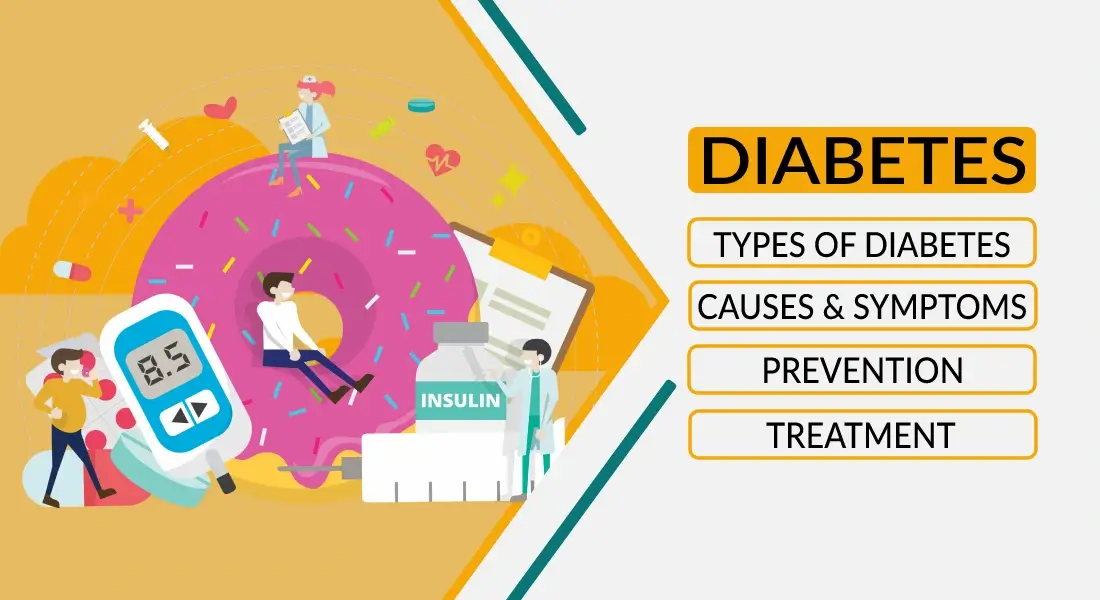Everything You Need to Know About Gestational Diabetes

On this page
Gestational diabetes in pregnancy involves abnormally higher blood sugar levels. The condition typically affects women who have never had diabetes before becoming pregnant. During pregnancy, the placenta produces hormones that can interfere with your body’s ability to use insulin effectively.
In the human body, insulin plays a crucial role in regulating blood sugar levels. Women with gestational diabetes may develop insulin resistance, where body cannot use the insulin properly through body. Medical practitioners opine that gestational diabetes usually develops around the 24th and 28th week of pregnancy. It can occur in the early stages of pregnancy too.
Gestational diabetes in pregnancy comes from hormonal changes and the way your bodies convert food into energy. Expectant mothers should be aware of this type of diabetes and follow a disciplined routine to avoid complications.
The Risk Factors Involved In Gestational Diabetes In Pregnancy
Managing gestational diabetes will make sure that you have a healthy pregnancy and a healthy baby. The risk factors associated with this type of diabetes are listed below:-
Women who are 25 years or older are at higher risk
- Having a close relative with diabetes is a potential risk factor
- Women with PCOS are at a higher risk
- Obesity can increase the risk of gestational diabetes
- Women from specific ethnic backgrounds have a higher risk of developing this illness
One of the best ways to manage diabetes during pregnancy is by modifying the lifestyle. For instance, maintaining a healthy diet and engaging in regular workouts can be helpful in controlling diabetes during pregnancy.
Symptoms Of Diabetes In Pregnancy – What Are The Aspects To Know?
Gestational diabetes typically doesn’t have any symptoms. Your medical history and whether you have any risk factors may help in the diagnosis of pregnancy during diabetes. It is crucial for expectant mothers to undergo frequent screening for diabetes during their prenatal care. Some of the symptoms associated with gestational diabetes are:-
1. Increased Thirst
Women with diabetes during pregnancy may feel excessively thirsty and need to drink more fluids periodically than usual.
2. Fatigue
Even with sufficient rest, pregnant women may feel tired or energy deficit.
3. Frequent Urination
During gestational diabetes, you may feel the sensation of urination more frequently and in larger quantities.
4. Recurrent Infections
Women with this type of diabetes may develop frequent urination tract infections.
Knowaledge about the Symptoms of diabetes in pregnancy will be helpful in managing the condition more effectively.
What Are The Exact Causes Of Diabetes In Pregnancy?
One should be aware of the significant cause of gestational diabetes to manage the illness effectively.
1. Hormonal Changes
It is one of the major causes of diabetes during pregnancy. During pregnancy, the placenta produces hormones that can interfere with your body’s insulin production. These hormones can cause insulin resistance, wherein the cells of your body don’t respond effectively to insulin. High blood sugar levels in pregnancy can cause anomalies in the later stages.
2. Insufficient Production of Insulin
In some cases, the pancreas may not produce enough insulin to meet the increased demands of your body during pregnancy. It can contribute to elevated blood sugar levels in expectant mothers. The best way to address this problem is by thorough monitoring of diet and lifestyle.
3. Genetic Factors
Note that genetic factors are also responsible for causing gestational diabetes. For instance, if one of your parents has diabetes, then it is likely that you can also suffer from the same. Genetic factors can influence insulin production and how your body handles glucose.
4. Increased Resistance to Insulin
It is another cause of gestational diabetes. Pregnancy naturally causes your body to become more resistant to insulin. Healthcare practitioners opine that it is an adaptive mechanism of your body to make sure that there’s an adequate supply of glucose to develop the foetus. But in some women, insulin resistance becomes excessive, which results in gestational diabetes.
5. Polycystic Ovary Syndrome (PCOS)
For effective gestational diabetes treatment, you should be aware of its causes. PCOS is an illness triggered by massive hormonal changes. In expectant others, PCOS can cause insulin resistance and hormonal imbalances. Doctors suggest that women with PCOS have a higher chance of developing diabetes during pregnancy.
6. Obesity and Excess Weight
Being overweight or obese before pregnancy can significantly increase the risk of developing gestational diabetes. Excess weight can contribute to insulin resistance and impair your body’s glucose metabolism. Therefore, proper screening is the best way to avoid gestational diabetes.
Note that these causes don’t guarantee that gestational diabetes will occur. Moreover, women without any risk factors can still develop this disease. That’s why opting for regular prenatal care can help recognise and manage gestational diabetes.
Gestational Diabetes Treatment – Things To Know
GDM treatment mainly focusses on managing your blood sugar levels to ensure a healthy pregnancy and decrease the risk of complications. The treatment methods for gestational diabetes are as follows:
1. Medical and Dietary Management
Most cases of gestational diabetes are manageable through lifestyle modifications. Regular physical activity and adhering to a healthy diet can help you stay protected from this type of diabetes. To learn more about pregnancy diabetes diet, you should consult with a certified doctor. Monitoring blood sugar levels at home with a glucose metre can track the impact of dietary choices.
2. Regular Prenatal Check-Ups
If you have gestational diabetes, it is crucial to opt for regular prenatal check-ups. These check-ups will help you monitor the progress of your pregnancy and check the baby’s growth. It can also help in assessing and managing blood sugar. You will receive guidance and support to make necessary adjustments to the treatment plan.
3. Regular Physical Activity
Besides having a pregnancy diabetes diet, you must indulge in regular physical activities. The last thing you want is to put on weight during pregnancy. Your healthcare practitioner is the best person to suggest you a wide variety of exercises and workouts during this stage. Walking and prenatal yoga are some of the most popular workout types during pregnancy.
Diagnostic Tests To Manage Gestational Diabetes
Here are some of the common diagnostic tests to manage gestational diabetes in women.
1. Oral Glucose Tolerance Test
The Oral Glucose Tolerance Test, also known as OGTT, is accurate in diagnosing gestational pregnancy. During an OGTT, you have to fast overnight. In the morning, a experienced staff will take your baseline blood sample to measure the fasting glucose level.
The staff will provide you with a glucose drink containing at least 70 grams of glucose. You need to consume the liquid within a specific time frame. Afterwards, the diagnostic lab will monitor your blood glucose levels every thirty minutes to two hours. You must know about the OGTT test price, it may vary centre to centre of any diagnostic lab.
2. Glucose Challenge Test in Pregnancy
This test is also known as GCT. GCT is a common prenatal test during pregnancy to screen for gestational diabetes mellitus. The GCT is typically conducted between the 24th and 28th week of your pregnancy. The test involves drinking a solution comprising glucose.
After consuming the glucose drink, you must wait for at least an hour. During this time, your body metabolises the glucose. Lab technicians will measure your glucose level through the blood sample. The main objective of GCT is to measure how well your body processes glucose. Patients undergoing this test must be aware of the GCT test price.
Overall, screening for gestational diabetes is a proactive measure to ensure the well-being of the mother and the baby. It allows for the timely management of the blood sugar levels.
DISCLAIMER: THIS WEBSITE DOES NOT PROVIDE MEDICAL ADVICE. The information including text, graphics, images, and other material contained on this website is for informational purposes only. No material on this site is intended to be a substitute for professional medical advice, diagnosis, or treatment. Contact a health expert if you have questions about your health.

















Comments List